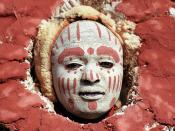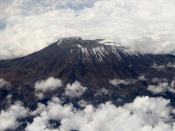Akamba Fossil evidence indicates that human beings originated in Africa, and their descendants have migrated throughout the world. "To be human is to be of African descent."ÃÂ (George C. Bond, Institute of African Studies).
Ancestors of the Akamba settled around Mt. Kilimanjaro, then migrated to the Chyulu hills because they needed area for farming, keeping livestock, and hunting. This area suffered from long droughts, so in the mid seventeenth century they moved toward the Mbooni hills. The Mbooni hills region was fertile and well watered, with dense forests and buffalo. As the Akamba population increased and grazing became scarce, some of the Akamba people moved to the plains. The Akamba depend on farming and livestock. They live in small settlements with high family priorities and organization.
Their language belongs to the Bantu group. They are dependent on one another in the region. Local and regional trading networks are based primarily on the exchange of food and livestock products.
Land and other property is inherited by the sons from the mother. The mother is given land to work from her husband, when she dies, her sons inherit the property. In order to be married all the parents must be happy with the alliance of the couple. The Akamba people practiced polygamy (the man can have more than one wife) but he must first obtain permission from both his father and wife before marrying another. A man may also inherit his brothers widow as a wife if she agreed. Divorce is rare because the family elders will get involved to try to save the problems that exist in the marriage. "A man can divorce his wife for laziness, unfaithfulness, or practicing witchcraft. A woman can divorce her husband on the grounds of cruelty"ÃÂ (The Heritage library of African Peoples, 19). The authority...


